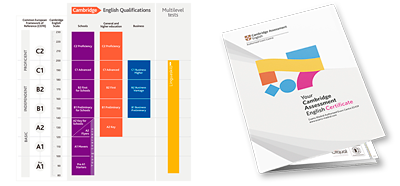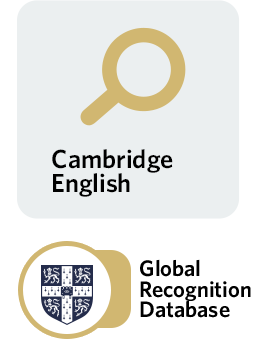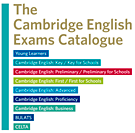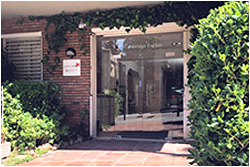
Cambridge English Business Certificates are recognised by employers, ministries, government bodies and professional organisations throughout the world. This valuable suite of three qualifications provides clear proof that you have the English skills to make you an asset to your employer. Achieve your ambitions in international business In today’s challenging business environment, companies are seeking employees with English language skills to help their organisation compete internationally. You can give yourself a vital advantage by making sure you have the language skills that employers are looking for. Cambridge English: Business Certificates are developed in accordance with the Common European Framework of Reference (CEFR) – the internationally accepted system for describing language ability. A clear route for progression Cambridge English Business Certificates feature three certificates that provide a progressive way to develop and improve Business English ability, and make it easy to prove to employers the exact level of your English skills. |

 |
 | |||
|
|
 | Language skills for real-life business situations |
| |
| Business B1 Preliminary, is set at Level B1 of the Common European Framework of Reference (CEFR). The content in Business B1 Preliminary
reflects everyday work and business tasks. Preparing for your exam will
give you skills that will make you an asset to your employer. At this level, you would be able to carry out basic office tasks such as:
| |||
 | Improving your employability and career prospects Proving your business English abilities can open the door to career opportunities with a new employer, or can make your ambitions for promotion or career development within your current organisation a reality. | ||
 | Clear, reliable evidence of your language ability Employers value and rely on Business B1 Preliminary because it is a thorough test of all four language skills (reading, writing, speaking and listening) in a business context. | ||
 | Fair and valid Cambridge English carries out detailed research and analysis to ensure all our exams are accurate, relevant and fair to the people that take them. The systems and processes meet the internationally recognised ISO 9001:2008 quality management standard. | ||
Business B1 Preliminary has 3 parts:
The Business B1 Preliminary Reading & Writing has seven parts for Reading and two tasks for Writing. There are different types of texts and questions.In the Reading part of the test you are tested on your ability to understand gist and detail and to identify main points and specific information. You are also tested on vocabulary and understanding the structure and development of a text. When examiners assess your writing, they will think about task achievement, range of structure and vocabulary, accuracy and control of language, organisation and cohesion, appropriacy of register and format and the effect the writing will have on the target reader. The Reading and Writing test accounts for 50% of the total mark – 25% for Reading and 25% for Writing. |
The Business B1 Preliminary Listening has four parts. For each part, you have to listen to a recorded text or texts and answer some questions. You hear each recording twice. The recordings are scripted. They all deal with business topics and situations. Nearly all have one or two speakers. The Listening test accounts for 25% of the total mark. |
The Business B1 Preliminary Speaking Test has three parts and you take it together with another candidate. There are two examiners. One of the examiners talks to you and the other examiner listens and takes notes. One examiner (the interlocutor) speaks to you, and the other (the assessor) does not take part in the test but listens to you speak and interact with the other candidate. Both examiners give you a mark, but the assessor gives more detailed marks than the interlocutor. The Speaking test accounts for 25% of the total mark. |
Exams Owl is our support site for candidates, schools and teachers. The
site provides comprehensive information on the exam structure and
content as well as support to help you or your students prepare for their exam:
- Sample tests - Speaking test videos
- Candidate information - Preparation resources
- Exam day tips - Candidate information - Preparation resources
Official support site of Exams Catalunya,Exams Catalunya and Exams Balears for Preparation Centres, Teachers and Candidates
In our portal Exams Owl you will find all the information you need
In our portal Exams Owl you will find all the information you need

 |
 | |||
|
|
 | Language skills for real-life business situations |
| |
| Business B2 Vantage, is set at Level B2 of the Common European Framework of Reference (CEFR). The content in Business B2 Vantage reflects
everyday work and business tasks. Preparing for your exam will give you
skills that will make you an asset to your employer. At this level you would be able to:
| |||
 | Improving your employability and career prospects Proving your business English abilities can open the door to career opportunities with a new employer, or can make your ambitions for promotion or career development within your current organisation a reality. | ||
 | Clear, reliable evidence of your language ability Employers value and rely on Business B2 Vantage because it is a thorough test of all four language skills (reading, writing, speaking and listening) in a business context. | ||
 | Fair and valid Cambridge English carries out detailed research and analysis to ensure all our exams are accurate, relevant and fair to the people that take them. The systems and processes meet the internationally recognised ISO 9001:2008 quality management standard. | ||
Business B2 Vantage has 4 parts:
The Business B2 Vantage Reading paper has four parts and different types of texts and questions. You are tested on your ability to understand gist, detail and the text structure and to identify main points and specific information. You are also tested on vocabulary, understanding discourse features and the ability to identify errors. The Reading test accounts for 25% of the total mark. |
The Business B2 Vantage Writing paper has different types of texts and questions. There are 2 parts. The scores are converted to provide a mark out 10 for Part 1 and a mark out of 20 for Part 2. The Writing paper is worth a total of 30 marks (25% of the total score). |
The Business B2 Vantage Listening paper has three parts. For each part you have to listen to a recorded text or texts and answer some questions. You hear each recording twice. The recordings are scripted. They all deal with business topics and situations. All have one or two speakers. The Listening test accounts for 25% of the total mark. |
The Business B2 Vantage Speaking Test has three parts and you take it together with another candidate. There are two examiners. One of the examiners conducts the test and the other examiner listens to what you say and takes notes. One examiner (the interlocutor) speaks to you, and the other (the assessor) does not take part in the test but listens to you speak and interact with the other candidate. Both examiners give you a mark, but the assessor gives more detailed marks than the interlocutor. The Speaking test accounts for 25% of the total mark. |
Exams Owl is our support site for candidates, schools and teachers. The
site provides comprehensive information on the exam structure and
content as well as support to help you or your students prepare for their exam:
- Sample tests - Speaking test videos
- Candidate information - Preparation resources
- Exam day tips - Candidate information - Preparation resources
Official support site of Exams Catalunya,Exams Catalunya and Exams Balears for Preparation Centres, Teachers and Candidates
In our portal Exams Owl you will find all the information you need
In our portal Exams Owl you will find all the information you need

 |
 | |||
|
|
 | Language skills for real-life business situations |
| |
| Business C1 Higher, is set at Level C1 of the Common European Framework of Reference (CEFR). Business C1 Higher shows
the employers that you have the drive and motivation to achieve an
advanced level of business English, and can use your skills to function
effectively in most international business situations. C1 is the level of English required for demanding professional and academic settings and shows employers you can:
| |||
 | Improving your employability and career prospects Proving your business English abilities can open the door to career opportunities with a new employer, or can make your ambitions for promotion or career development within your current organisation a reality. | ||
 | Clear, reliable evidence of your language ability Employers value and rely on Business C1 Higher because it is a thorough test of all four language skills (reading, writing, speaking and listening) in a business context. | ||
 | Fair and valid Cambridge English carries out detailed research and analysis to ensure all our exams are accurate, relevant and fair to the people that take them. The systems and processes meet the internationally recognised ISO 9001:2008 quality management standard. | ||
Business C1 Higher has 4 parts:
The Business C1 Higher Reading paper has six parts with different types of texts and questions. You are also tested on vocabulary, understanding discourse features and the ability to identify errors. The Reading paper is worth 25% of the total score. |
For the Business C1 Higher Writing paper you have to show that you can write different types of text in English. There are two parts. Part 2 is worth twice as many marks as Part 1. The Writing paper is worth a total of 30 marks (25% of the total score). |
The Business C1 Higher Listening paper has three parts. For each part you have to listen to a recorded text or texts and answer some questions. You hear each recording twice. The recordings are scripted. They all deal with business topics and situations. Nearly all have one or two speakers. The Listening test accounts for 25% of the total mark. |
The Business C1 Higher Speaking Test has three parts and you take it together with another candidate. There are two examiners. One of the examiners (the interlocutor) conducts the test and the other examiner (the assessor) listens to what you say and takes notes. The Speaking test accounts for 25% of the total mark. |
Exams Owl is our support site for candidates, schools and teachers. The
site provides comprehensive information on the exam structure and
content as well as support to help you or your students prepare for their exam:
- Sample tests - Speaking test videos
- Candidate information - Preparation resources
- Exam day tips - Candidate information - Preparation resources
Official support site of Exams Catalunya,Exams Catalunya and Exams Balears for Preparation Centres, Teachers and Candidates
In our portal Exams Owl you will find all the information you need
In our portal Exams Owl you will find all the information you need
about results and certificates.


- Exam results - Statement of Results
- Checking and verifying results - Certificates
- Checking and verifying results - Certificates
- Enquiries and appeals - Lost certificates
| Are you a private candidate? It’s easy to register for Cambridge English: Business in just three steps: |
|
|
|















 C/ Freixa, 5-9
C/ Freixa, 5-9